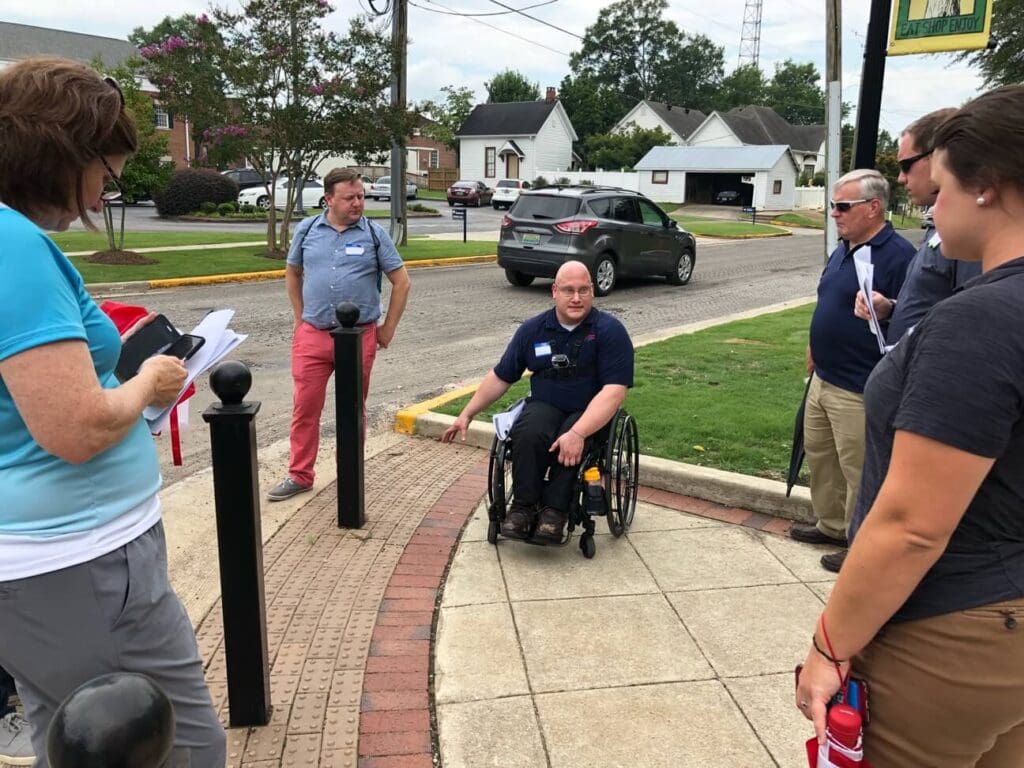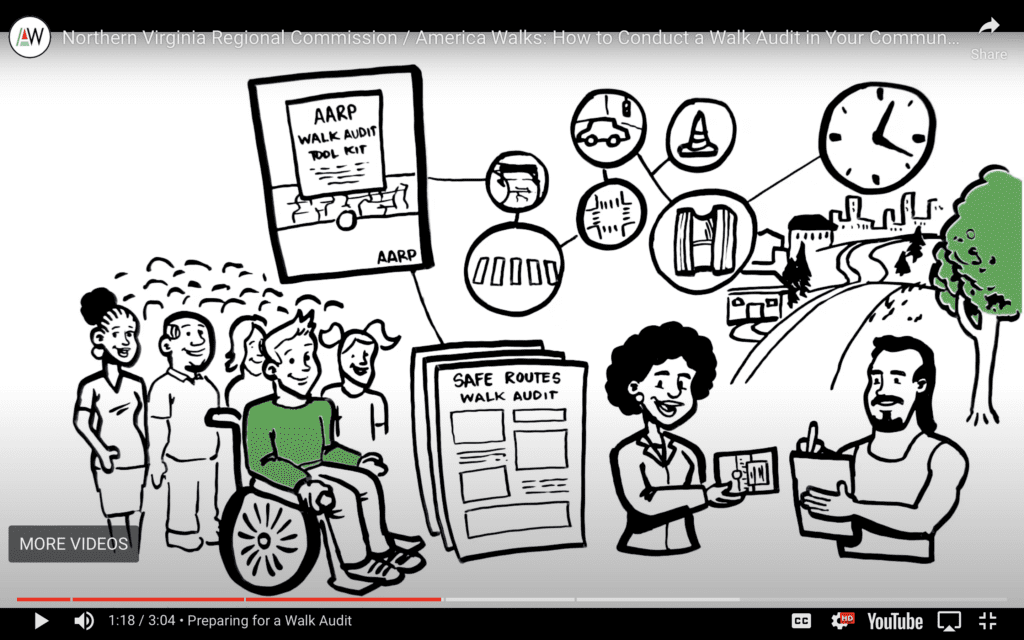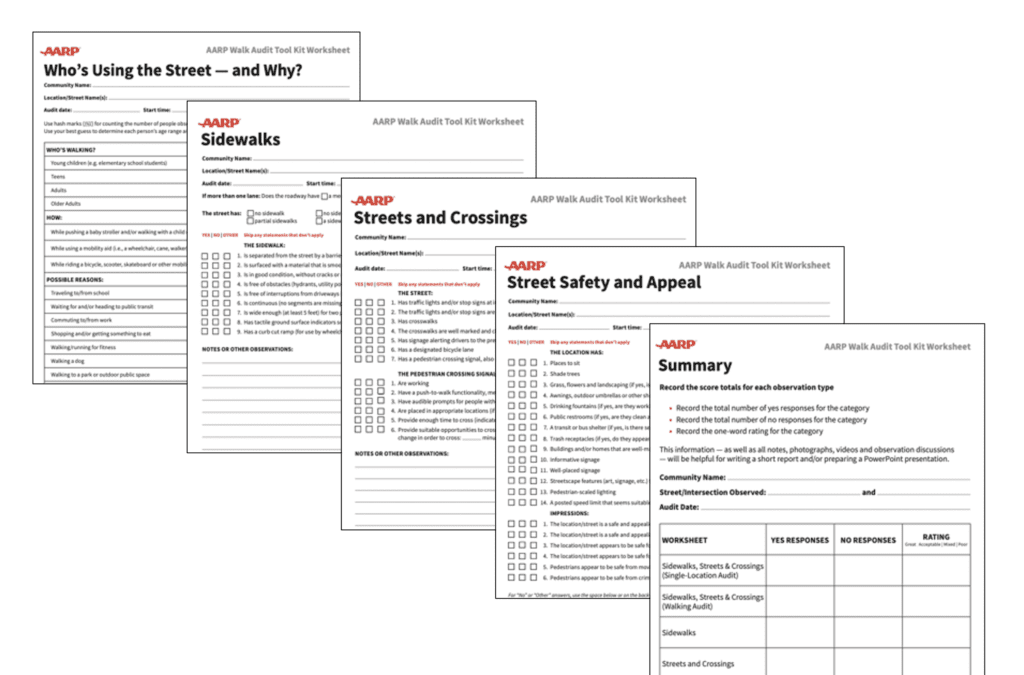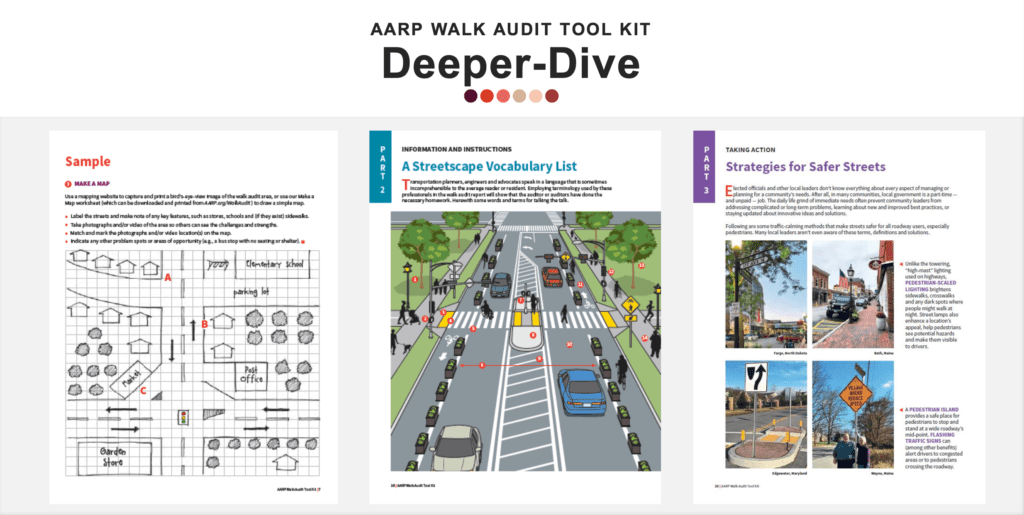A Walk Audit is often the first step towards policy, system, and environment change which can improve a community for people of all ages.

On Tuesday, February 14th, America Walks and AARP Livable Communities co-hosted a webinar on Walk Audits and announced a new opportunity for funding and technical assistance. The Walk Audit:An Effective Tool for Community Change provided an overview of how to organize a Walk Audit and included a panel of Walking College Fellows who discussed their own success stories.
The AARP Walk Audit Tool Kit
The Walk Audit is an extremely versatile tool for walkable community advocates. It can be used to engage the public, build awareness of the importance of walkable design, identify specific pedestrian safety issues, and advance policy and community development goals. Walk Audits can be conducted alone, with a group of other concerned residents to document needed changes, or with public officials who have the power to do something about it.

America Walks’ How to Conduct a Walk Audit video identifies the “Top Ten Tips” for leading a successful Walk Audit:
- Scout the route carefully ahead of time.
- Don’t make it too long – one mile is about right.
- Identify a diverse group of participants.
- Invite one or two public officials.
- Choose a guide such as the AARP Walk Audit Tool Kit
- Bring along clipboards, printed guides, and pens.
- Before starting, remind everyone to prioritize safety.
- Stop every few blocks to analyze conditions. make notes. and take photos.
- At the end, ask everyone to share their takeaways.
- Take everything you’ve learned and build a compelling presentation.
During the first segment of the webinar, Rebecca Delphia (Senior Advisor with AARP Livable Communities) provided an overview of AARP’s Walk Audit Tool Kit. This publication (which is a “must have” for every walkable community advocate) is available free of charge from the AARP website in both PDF and print formats.
Part 1 (“Getting Started”) consists of a series of simple step-by-step instructions for planning and conducting a Walk Audit. Part 2 (“Information and Instructions”) dives into the details with a “Streetscape Vocabulary List,” discussion of the concept of “Complete Streets,” and a walkability rating scale from “great” to “poor.” And Part 3 (“Taking Action”) provides valuable advice on how to present the results of a Walk Audit to elected officials and other decision-makers and advocate effectively for improvements.
Finally, the Walk Audit Tool Kit includes eleven one-page worksheets, each of which focuses on a single aspect of walkability such as “Sidewalks and Crossings,” “Street Safety and Appeal,” and Who’s Using the Street — and Why?”

“Quick Wins” Resulting from Walk Audits
In the next segment of the webinar, three walkable community advocates (all graduates of the AARP State Walking College program) presented details of Walk Audits they have organized and how they led to “quick wins.”
Whitney Jibben was a 2021 Fellow with the South Dakota State Walking College. In her role as an administrator at Augustana University in Sioux Falls, Whitney led a Campus Walk Audit focused on student mobility and the goal of reducing the number of vehicles on campus. The overall conclusion was that pedestrian safety and comfort needed to be improved, and specific issues with lighting, sidewalk maintenance, and green space were identified.

Several worksheets from the AARP Walk Audit Tool Kit were used to document the group’s findings. Whitney credits this data-driven approach for the fact that, following the Walk Audit, improvements were written into the University’s Grounds Maintenance Plan. She also shared her strategy with a national audience by giving a presentation and leading a Walk Audit at the College Housing and Facilities Conference.
Ariel Hamburger is a Land Use and Environmental Planner with the County of San Diego. In 2021, she completed a Fellowship with the California State Walking College, and focused her Walking Action Plan on the North Park neighborhood of San Diego, where she lives. During her webinar presentation, Ariel described the problems caused by excessive vehicle speeds on 30th Avenue, which has lots of destinations residents want to access by walking.
The Walk Audit was conducted in partnership with a professor at San Diego State University and her class on Research Methods. Students performed counts of pedestrians and cyclists, interviews with passers-by, and a land-use analysis – outcomes included the installation of bike racks and pollinator planters. Coincidentally, the San Diego Association of Governments installed crosswalks one block south of the audit area, and so Ariel is now using those data to advocate for marked crosswalks at every intersection in this busy, multimodal corridor.
The final webinar presentation was delivered by Niki Delson and Kevin Schorzman from Carbondale, Colorado. Niki (an organizer with Age-Friendly Carbondale, a former member of the Town’s Bicycle, Pedestrian, and Trails Commission, and a graduate of the 2022 Colorado State Walking College) has performed dozens of Walk Audits with the AARP Tool Kit over many years.
Whilst on the Commission, she started working with Kevin (the Town’s Public Works Director) to correct specific pedestrian hazards identified during the Walk Audits. Kevin commented on the importance of this relationship because his staff did not have time or capacity to audit the sidewalks.
During the discussion portion of the webinar, all the panelists noted that a Walk Audit serves two valuable purposes – as a data-gathering process and as an educational and awareness-building activity.
Funding and Resources for Conducting Walk Audits
In the final segment of the webinar, Rebecca made an announcement about this year’s AARP Community Challenge grant program, which helps communities become great places for people of all ages. In 2023, a new funding opportunity – Capacity-Building Microgrants – combines $2,500 in funding with training, cohort learning opportunities, and one-on-one coaching from America Walks to help communities to implement Walk Audits.
The online application process closes on March 15th, 2023.